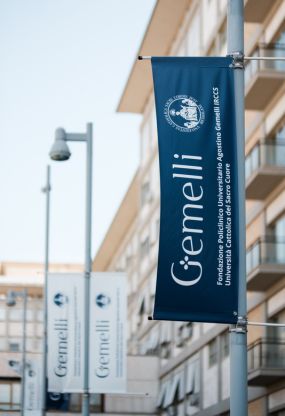Accredited School
The specialist in Infectious and Tropical Diseases must possess theoretical, scientific and professional knowledge in the field of pathophysiology and clinical of infectious diseases. The specific areas of clinical expertise concern functional and instrumental semeiotics, clinical methodology and therapy in infectious diseases, parasitology, mycology and clinical virology and sexually transmitted diseases, and the diagnostic and clinical pathophysiology of diseases with prevalent tropical spread.
Basic educational objectives: acquisition of basic knowledge of morphological, biochemical and physiological sciences and knowledge of general pathophysiology of infectious diseases and tropical pathology (genetic, deficiency) and of the basic disciplines specifically related to them (clinical microbiology, clinical virology, clinical parasitology, clinical mycology, medical entomology and clinical immunology, statistics, epidemiology, and hygiene), also with reference to the climatic aspects of the tropical ecosystem.
General training objectives: the student must acquire the correct statistical approach and the methodological bases of laboratory, clinic, therapy, epidemiology and community medicine, as well as the ability to continuously renew their professional knowledge also in order to be able to carry out health planning, hygiene and prophylaxis, health management and emergency activities;
educational objectives of the type of School: acquisition of clinical skills (for diagnosis, prognosis, therapy and evaluation of results) and laboratory-instrumental skills of infectious diseases (of any etiology, of the entire life cycle, for every organ and apparatus, of every geographical area both in the immunocompetent and in the immunosuppressed) and in any case prevalent in tropical areas and with limited resources; acquisition of the necessary expertise both for the epidemiological study and for the prophylaxis of infectious diseases and for the management of clinical departments even in situations of limited resources.
Integrated training objectives (i.e. common trunk): the student must have acquired satisfactory theoretical knowledge and professional competence in the clinical and instrumental diagnosis and treatment, even in emergency-urgency conditions, of the most common internal pathologies. The student must acquire the fundamental knowledge of the pathophysiology of the various organs and systems, the theoretical and practical knowledge necessary for the recognition of diseases affecting the different systems of the body, the theoretical and practical knowledge of the main sectors of instrumental and laboratory diagnostics related to the aforementioned diseases, the acquisition of the ability to evaluate internal and specialist connections and influences. He must therefore be able to recognize the symptoms and clinical-functional signs with which diseases of various organs and systems manifest themselves, having acquired the fundamental diagnostic, therapeutic, psychological and ethical knowledge necessary for a global vision of the patient. To this end, the ability to clinically frame the patient on the basis of the anamnesis and physical examination must mature; develop critical and analytical diagnostic skills; become familiar with the main diagnostic procedures and laboratory-instrumental investigations; recognise and be able to deal with major medical emergencies; familiarize themselves with therapeutic resources in order to plan their optimal use and recognize their indications and contraindications, as well as the effects of interaction and possible iatrogenic accidents; acquire the fundamental notions relating to clinical research methodologies and pharmacological trials; know the fundamental problems related to prevention, public health and social medicine. The resident must have acquired satisfactory theoretical knowledge and professional competence in the recognition and treatment, in emergency-urgency conditions, of the most common pathologies. Finally, the resident must also know, from a clinical and therapeutic point of view, the most common pathologies of competence of the other types of the class.
The following are compulsory professionalizing activities for the achievement of the educational purposes of the type:
- have followed at least 200 clinical cases, of which part in professional autonomy, relating to infectious diseases of both immunocompetent and immunosuppressed patients, acquired in hospital or in the community, including imported diseases. Of these, at least 50 cases must be related to tropical diseases and at least 25 in migrants;
- have developed experience in the prevention and control of infections or outbreaks developed in hospital or in the community;
- have followed the diagnostic itinerary, with particular regard to laboratory diagnostics, of at least 200 clinical cases relating to infectious diseases. Of these, at least 50 cases must be related to tropical diseases;
- to be able to interpret the results of microbiological examinations aimed both at identifying the microorganism and at assessing the susceptibility of bacteria, viruses and fungi to drugs; know how to prepare and read a haemoscopic preparation (thin smear and thick drop) for the search for haemoparasites;
- have performed at least 50 consultations (diagnostic or preventive) on travel medicine, including the correct indication of chemovaccine prophylaxis;
- participation in the conduct, in accordance with the rules of good clinical practice, of controlled clinical trials;
- participation in the execution of blood cultures and cultures of other biological fluids, lumbar puncture, thoracentesis, paracentesis and puncture of superficial abscesses.
The student will be able to compete for the diploma after completing the professionalizing activities.
As part of the training course, the student will have to learn the scientific bases of the type of School in order to achieve full maturity and professional competence that includes an adequate ability to interpret scientific innovations and critical knowledge that allows him to consciously manage both assistance and his own updating; In this context, participation in meetings, congresses and the production of scientific publications and periods of attendance in qualified Italian and foreign institutions useful for his/her training may be envisaged.




